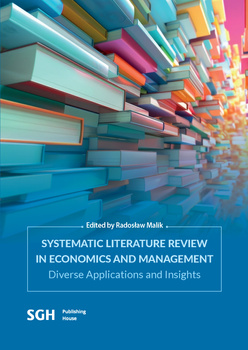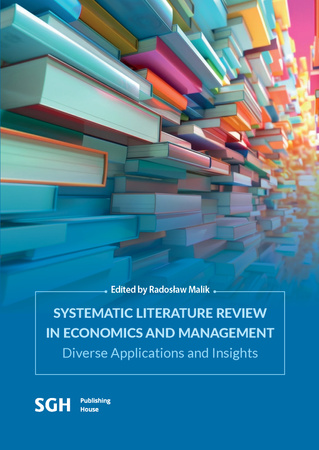
[[[separator]]]
This scientific monograph comprises twelve chapters authored by students of the SGH Warsaw School of Economics who participated in the academic year 2024/2025 in the sixth edition of the SGH Young Scientist Programme, which is designed to foster the skills and intellectual aspirations of students in scientific work and research. The chapters encompass a variety of themes within Economics and Management studies, reflecting the high potential and intellectual ambitions of these emerging scholars. For many, this publication marks their debut in scientific writing, showcasing their dedication, interests and growing expertise in their respective fields. The utilisation of Systematic Literature Review (SLR) as the primary research method across all chapters in this monograph underscores its significance in advancing academic inquiry. SLR offers a structured and transparent approach to synthesising existing knowledge, enabling researchers to identify trends, gaps and research opportunities within the literature. This method enhances the rigor and reliability of findings by systematically selecting and evaluating relevant studies, thereby reducing bias and ensuring comprehensive coverage of the subject matter. Moreover, SLR facilitates the integration of diverse perspectives and fosters a deeper understanding of complex issues in Economics and Management. By employing SLR, the authors stimulate progress in their chosen research themes and build their skills as future researchers. Furthermore, research gaps identified in their chapters pave the way for their future empirical research and more significant contributions. All the chapters in this monograph also apply the PRISMA (Preferred Reporting Items for Systematic Reviews and Meta-Analyses) guidelines to enhance the structure and transparency of their SLRs. The use of PRISMA offers several relevant benefits, including improved clarity in the reporting process, increased reproducibility of findings, and a more systematic approach to identifying and selecting studies. By adhering to PRISMA, researchers can ensure that their reviews are comprehensive and unbiased, thereby enhancing the credibility of their conclusions. This approach, originally developed in the life sciences, is particularly important as a best practice significantly improving the quality of research in the social sciences, especially in Economics and Management studies, and therefore creating a solid foundation for the research undertaken in this scientific monograph.
(fragment of the introduction)
[[[separator]]]
Preface
Radosław Malik
Chapter 1
Austerity and Income Inequality – Evidence from the Iberian Peninsula
Marcin Grygo
Chapter 2
Implications of Heterogeneous Agent New Keynesian (HANK) Models on Monetary Policy
Kamil Rogoziński
Chapter 3
The Role of Highways in Regional Economic Growth – Case of China
Radosław Rybakowski
Chapter 4
Cognitive Biases and Strategic Behaviour in the Formulation of Judgemental Macroeconomic Forecasts by Professionals
Dawid Sułkowski
Chapter 5
An Analysis of China’s Misbehaviour regarding WTO Accession Commitments
Bartosz Traczyk
Chapter 6
Brain Drain Impact on the Economic Development of Sending Countries
Artur Veryho
Chapter 7
The Impact of the Price Cap on Russian Oil
Michał Wielechowski
Chapter 8
Adoption Policies in a Global Context
Martyna Smółka
Chapter 9
Risk Management Strategies and Their Impact on the Success Rate in Space Projects
Marta Ekner
Chapter 10
Mathematical Approaches to Political Coalition Formation
Lukas Kasica
Chapter 11
Analysing Political Polarisation through Natural Language Processing
Franciszek Michałowski
Chapter 12
The Domestic Dimension of Public Diplomacy
Błażej Ulman
Opis
Wstęp
This scientific monograph comprises twelve chapters authored by students of the SGH Warsaw School of Economics who participated in the academic year 2024/2025 in the sixth edition of the SGH Young Scientist Programme, which is designed to foster the skills and intellectual aspirations of students in scientific work and research. The chapters encompass a variety of themes within Economics and Management studies, reflecting the high potential and intellectual ambitions of these emerging scholars. For many, this publication marks their debut in scientific writing, showcasing their dedication, interests and growing expertise in their respective fields. The utilisation of Systematic Literature Review (SLR) as the primary research method across all chapters in this monograph underscores its significance in advancing academic inquiry. SLR offers a structured and transparent approach to synthesising existing knowledge, enabling researchers to identify trends, gaps and research opportunities within the literature. This method enhances the rigor and reliability of findings by systematically selecting and evaluating relevant studies, thereby reducing bias and ensuring comprehensive coverage of the subject matter. Moreover, SLR facilitates the integration of diverse perspectives and fosters a deeper understanding of complex issues in Economics and Management. By employing SLR, the authors stimulate progress in their chosen research themes and build their skills as future researchers. Furthermore, research gaps identified in their chapters pave the way for their future empirical research and more significant contributions. All the chapters in this monograph also apply the PRISMA (Preferred Reporting Items for Systematic Reviews and Meta-Analyses) guidelines to enhance the structure and transparency of their SLRs. The use of PRISMA offers several relevant benefits, including improved clarity in the reporting process, increased reproducibility of findings, and a more systematic approach to identifying and selecting studies. By adhering to PRISMA, researchers can ensure that their reviews are comprehensive and unbiased, thereby enhancing the credibility of their conclusions. This approach, originally developed in the life sciences, is particularly important as a best practice significantly improving the quality of research in the social sciences, especially in Economics and Management studies, and therefore creating a solid foundation for the research undertaken in this scientific monograph.
(fragment of the introduction)
Spis treści
Preface
Radosław Malik
Chapter 1
Austerity and Income Inequality – Evidence from the Iberian Peninsula
Marcin Grygo
Chapter 2
Implications of Heterogeneous Agent New Keynesian (HANK) Models on Monetary Policy
Kamil Rogoziński
Chapter 3
The Role of Highways in Regional Economic Growth – Case of China
Radosław Rybakowski
Chapter 4
Cognitive Biases and Strategic Behaviour in the Formulation of Judgemental Macroeconomic Forecasts by Professionals
Dawid Sułkowski
Chapter 5
An Analysis of China’s Misbehaviour regarding WTO Accession Commitments
Bartosz Traczyk
Chapter 6
Brain Drain Impact on the Economic Development of Sending Countries
Artur Veryho
Chapter 7
The Impact of the Price Cap on Russian Oil
Michał Wielechowski
Chapter 8
Adoption Policies in a Global Context
Martyna Smółka
Chapter 9
Risk Management Strategies and Their Impact on the Success Rate in Space Projects
Marta Ekner
Chapter 10
Mathematical Approaches to Political Coalition Formation
Lukas Kasica
Chapter 11
Analysing Political Polarisation through Natural Language Processing
Franciszek Michałowski
Chapter 12
The Domestic Dimension of Public Diplomacy
Błażej Ulman
Opinie
This scientific monograph comprises twelve chapters authored by students of the SGH Warsaw School of Economics who participated in the academic year 2024/2025 in the sixth edition of the SGH Young Scientist Programme, which is designed to foster the skills and intellectual aspirations of students in scientific work and research. The chapters encompass a variety of themes within Economics and Management studies, reflecting the high potential and intellectual ambitions of these emerging scholars. For many, this publication marks their debut in scientific writing, showcasing their dedication, interests and growing expertise in their respective fields. The utilisation of Systematic Literature Review (SLR) as the primary research method across all chapters in this monograph underscores its significance in advancing academic inquiry. SLR offers a structured and transparent approach to synthesising existing knowledge, enabling researchers to identify trends, gaps and research opportunities within the literature. This method enhances the rigor and reliability of findings by systematically selecting and evaluating relevant studies, thereby reducing bias and ensuring comprehensive coverage of the subject matter. Moreover, SLR facilitates the integration of diverse perspectives and fosters a deeper understanding of complex issues in Economics and Management. By employing SLR, the authors stimulate progress in their chosen research themes and build their skills as future researchers. Furthermore, research gaps identified in their chapters pave the way for their future empirical research and more significant contributions. All the chapters in this monograph also apply the PRISMA (Preferred Reporting Items for Systematic Reviews and Meta-Analyses) guidelines to enhance the structure and transparency of their SLRs. The use of PRISMA offers several relevant benefits, including improved clarity in the reporting process, increased reproducibility of findings, and a more systematic approach to identifying and selecting studies. By adhering to PRISMA, researchers can ensure that their reviews are comprehensive and unbiased, thereby enhancing the credibility of their conclusions. This approach, originally developed in the life sciences, is particularly important as a best practice significantly improving the quality of research in the social sciences, especially in Economics and Management studies, and therefore creating a solid foundation for the research undertaken in this scientific monograph.
(fragment of the introduction)
Preface
Radosław Malik
Chapter 1
Austerity and Income Inequality – Evidence from the Iberian Peninsula
Marcin Grygo
Chapter 2
Implications of Heterogeneous Agent New Keynesian (HANK) Models on Monetary Policy
Kamil Rogoziński
Chapter 3
The Role of Highways in Regional Economic Growth – Case of China
Radosław Rybakowski
Chapter 4
Cognitive Biases and Strategic Behaviour in the Formulation of Judgemental Macroeconomic Forecasts by Professionals
Dawid Sułkowski
Chapter 5
An Analysis of China’s Misbehaviour regarding WTO Accession Commitments
Bartosz Traczyk
Chapter 6
Brain Drain Impact on the Economic Development of Sending Countries
Artur Veryho
Chapter 7
The Impact of the Price Cap on Russian Oil
Michał Wielechowski
Chapter 8
Adoption Policies in a Global Context
Martyna Smółka
Chapter 9
Risk Management Strategies and Their Impact on the Success Rate in Space Projects
Marta Ekner
Chapter 10
Mathematical Approaches to Political Coalition Formation
Lukas Kasica
Chapter 11
Analysing Political Polarisation through Natural Language Processing
Franciszek Michałowski
Chapter 12
The Domestic Dimension of Public Diplomacy
Błażej Ulman

